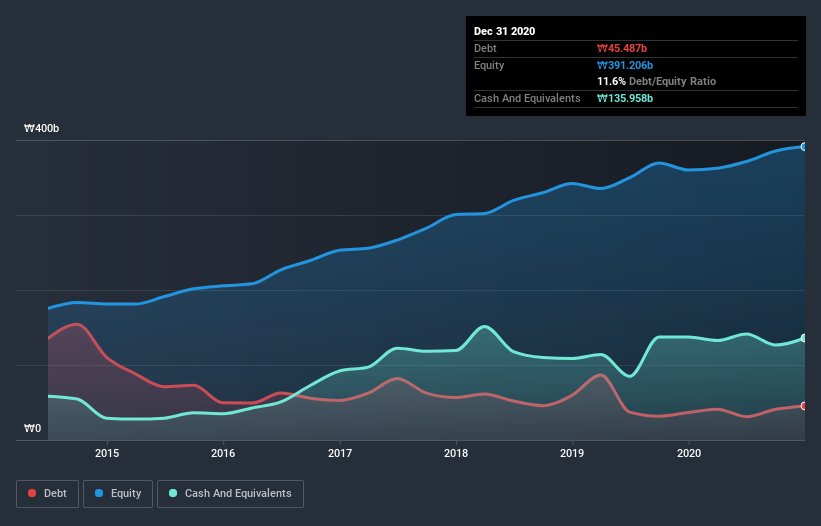
Warren Buffett famously said, 'Volatility is far from synonymous with risk.' So it might be obvious that you need to consider debt, when you think about how risky any given stock is, because too much debt can sink a company. We note that Aekyung Petrochemical Co., Ltd. (KRX:161000) does have debt on its balance sheet. But is this debt a concern to shareholders?
When Is Debt A Problem?
Debt and other liabilities become risky for a business when it cannot easily fulfill those obligations, either with free cash flow or by raising capital at an attractive price. In the worst case scenario, a company can go bankrupt if it cannot pay its creditors. However, a more common (but still painful) scenario is that it has to raise new equity capital at a low price, thus permanently diluting shareholders. Of course, debt can be an important tool in businesses, particularly capital heavy businesses. When we think about a company's use of debt, we first look at cash and debt together.
View our latest analysis for Aekyung Petrochemical
What Is Aekyung Petrochemical's Debt?
The image below, which you can click on for greater detail, shows that at December 2020 Aekyung Petrochemical had debt of ₩45.5b, up from ₩36.7b in one year. But it also has ₩136.0b in cash to offset that, meaning it has ₩90.5b net cash.

How Strong Is Aekyung Petrochemical's Balance Sheet?
The latest balance sheet data shows that Aekyung Petrochemical had liabilities of ₩126.1b due within a year, and liabilities of ₩14.8b falling due after that. On the other hand, it had cash of ₩136.0b and ₩64.1b worth of receivables due within a year. So it actually has ₩59.1b more liquid assets than total liabilities.
This excess liquidity suggests that Aekyung Petrochemical is taking a careful approach to debt. Given it has easily adequate short term liquidity, we don't think it will have any issues with its lenders. Succinctly put, Aekyung Petrochemical boasts net cash, so it's fair to say it does not have a heavy debt load!
Also positive, Aekyung Petrochemical grew its EBIT by 22% in the last year, and that should make it easier to pay down debt, going forward. When analysing debt levels, the balance sheet is the obvious place to start. But it is Aekyung Petrochemical's earnings that will influence how the balance sheet holds up in the future. So if you're keen to discover more about its earnings, it might be worth checking out this graph of its long term earnings trend.
Finally, a company can only pay off debt with cold hard cash, not accounting profits. While Aekyung Petrochemical has net cash on its balance sheet, it's still worth taking a look at its ability to convert earnings before interest and tax (EBIT) to free cash flow, to help us understand how quickly it is building (or eroding) that cash balance. In the last three years, Aekyung Petrochemical's free cash flow amounted to 31% of its EBIT, less than we'd expect. That weak cash conversion makes it more difficult to handle indebtedness.
Summing up
While we empathize with investors who find debt concerning, you should keep in mind that Aekyung Petrochemical has net cash of ₩90.5b, as well as more liquid assets than liabilities. And we liked the look of last year's 22% year-on-year EBIT growth. So we don't think Aekyung Petrochemical's use of debt is risky. The balance sheet is clearly the area to focus on when you are analysing debt. But ultimately, every company can contain risks that exist outside of the balance sheet. To that end, you should learn about the 3 warning signs we've spotted with Aekyung Petrochemical (including 1 which doesn't sit too well with us) .
Of course, if you're the type of investor who prefers buying stocks without the burden of debt, then don't hesitate to discover our exclusive list of net cash growth stocks, today.
If you decide to trade Aekyung Petrochemical, use the lowest-cost* platform that is rated #1 Overall by Barron’s, Interactive Brokers. Trade stocks, options, futures, forex, bonds and funds on 135 markets, all from a single integrated account. Promoted
New: Manage All Your Stock Portfolios in One Place
We've created the ultimate portfolio companion for stock investors, and it's free.
• Connect an unlimited number of Portfolios and see your total in one currency
• Be alerted to new Warning Signs or Risks via email or mobile
• Track the Fair Value of your stocks
This article by Simply Wall St is general in nature. It does not constitute a recommendation to buy or sell any stock, and does not take account of your objectives, or your financial situation. We aim to bring you long-term focused analysis driven by fundamental data. Note that our analysis may not factor in the latest price-sensitive company announcements or qualitative material. Simply Wall St has no position in any stocks mentioned.
*Interactive Brokers Rated Lowest Cost Broker by StockBrokers.com Annual Online Review 2020
Have feedback on this article? Concerned about the content? Get in touch with us directly. Alternatively, email editorial-team (at) simplywallst.com.
About KOSE:A161000
Medium-low with imperfect balance sheet.
Market Insights
Community Narratives



